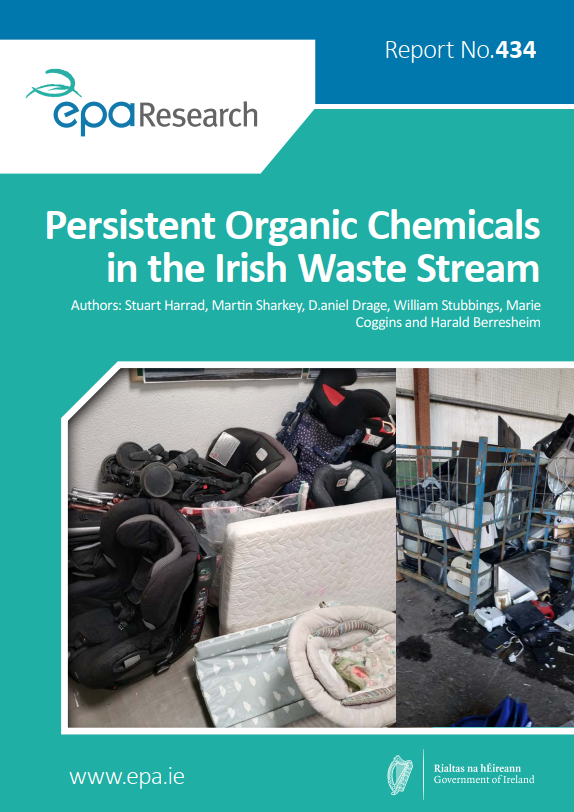
Authors: Stuart Harrad, Martin Sharkey, D.aniel Drage, William Stubbings, Marie Coggins and Harald Berresheim, June 2023
Year: 2023
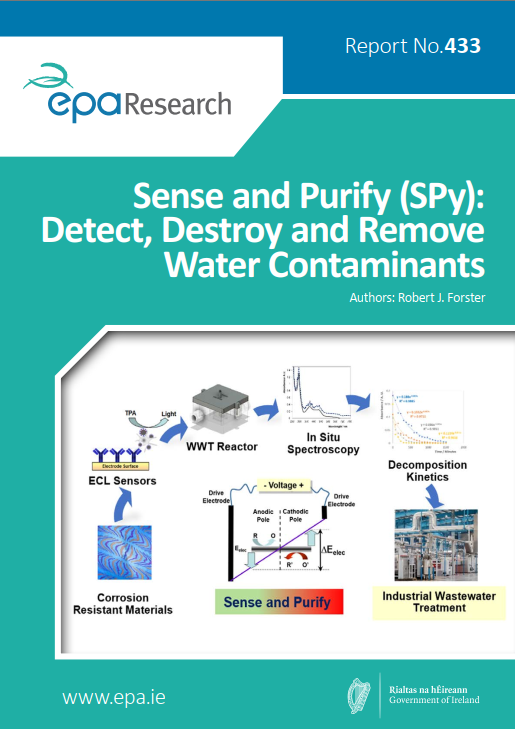
Authors: Robert J. Forster, June 2023
Year: 2023
Many wastewater streams, such as those from the pharmaceutical and food industries or from municipal wastewater, for example, contain pollutants. The SPy project developed the eco-innovative ‘Sense and Purify’ (SPy) technology, which has significant advantages over traditional treatment processes, including low operations costs, significantly lower energy consumption, higher conversion efficiency, better effluent water quality and lower waste production.
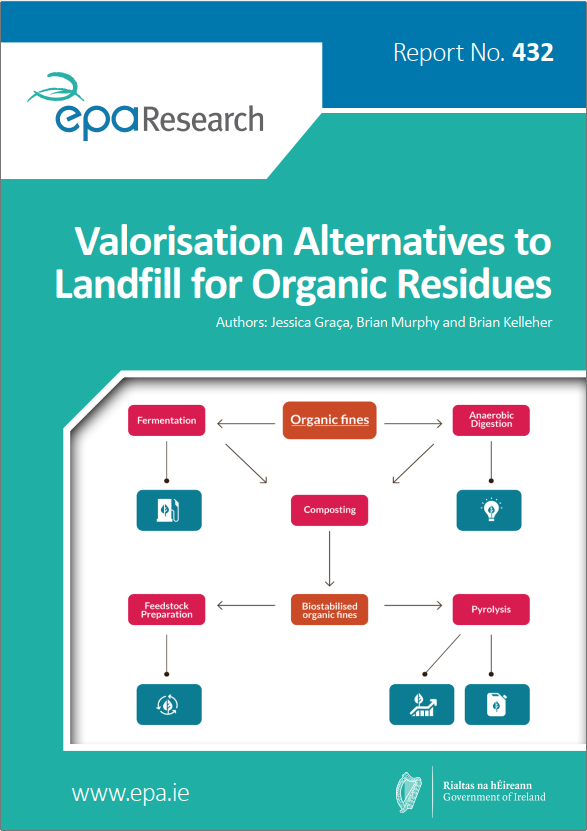
Authors: Jessica Graça, Brian Murphy and Brian Kelleher, May 2023
Year: 2023
The EPA’s latest data (November 2022) show that municipal waste generation increased by over 440,000 tonnes in the last 5 years, and now amounts to 3.2 million tonnes. The VALOR study looked at how the resource value of the mechanically separated organic fraction of municipal solid waste (MS-OFMSW) can be maximised. The study also characterised the organic fractions of municipal solid waste (MSW).
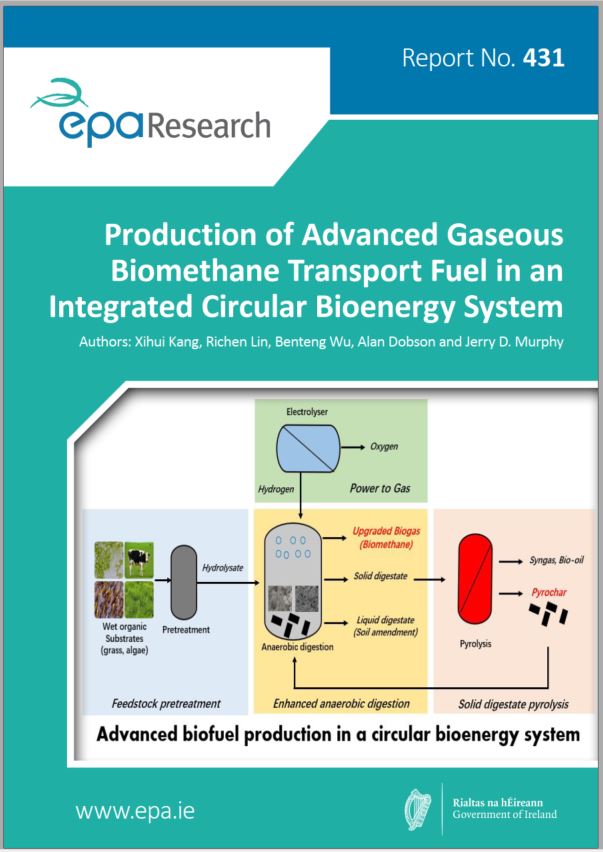
Authors: Xihui Kang, Richen Lin, Benteng Wu, Alan Dobson and Jerry D. Murphy, April 2023
Year: 2023
Transport is by far the largest source of energy-related CO2 emissions in Ireland. This highlights the need for a rapid transition from a linear fossil fuel-based economy to a bio-based economy that treats waste as a commodity, reduces GHG emissions, sequesters carbon and produces biofuels, biofertilisers, and bioproducts. The aim of the Advanced Gaseous Biomethane project was to develop an integrated system that produces biomethane using biomass to fuel the transport sector cleanly and support Ireland in achieving key emissions targets.
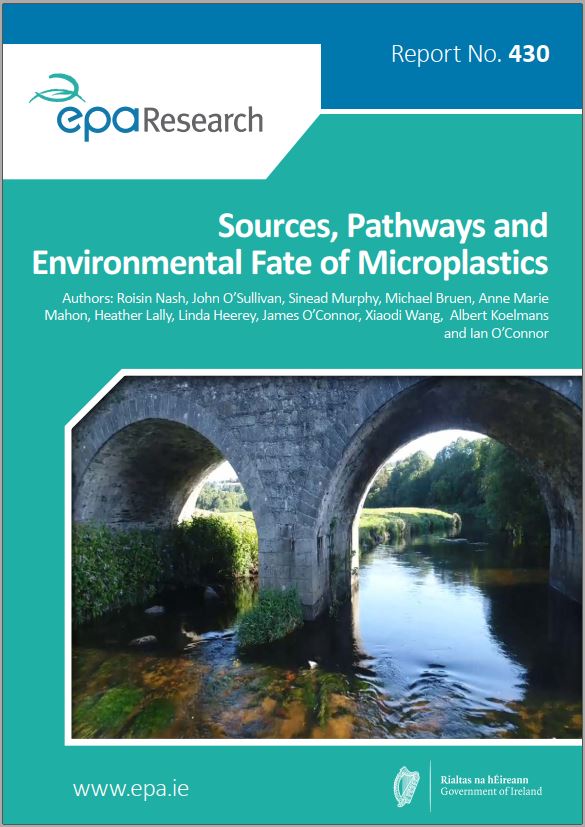
Authors: Roisin Nash, John O’Sullivan, Sinead Murphy, Michael Bruen, Anne Marie Mahon, Heather Lally, Linda Heerey, James O’Connor, Xiaodi Wang, Albert Koelmans and Ian O’Connor, March 2023
Year: 2023
As plastic production continues to increase, we are seeing significant quantities of microplastics (MPs), a contaminant of emerging concern, being recorded worldwide. This research project has identified key challenges and recommendations that target MP pollution, highlighting immediate measures that could manage MP debris at known sources. This will inform the development and implementation of policies such as the Water Framework Directive.
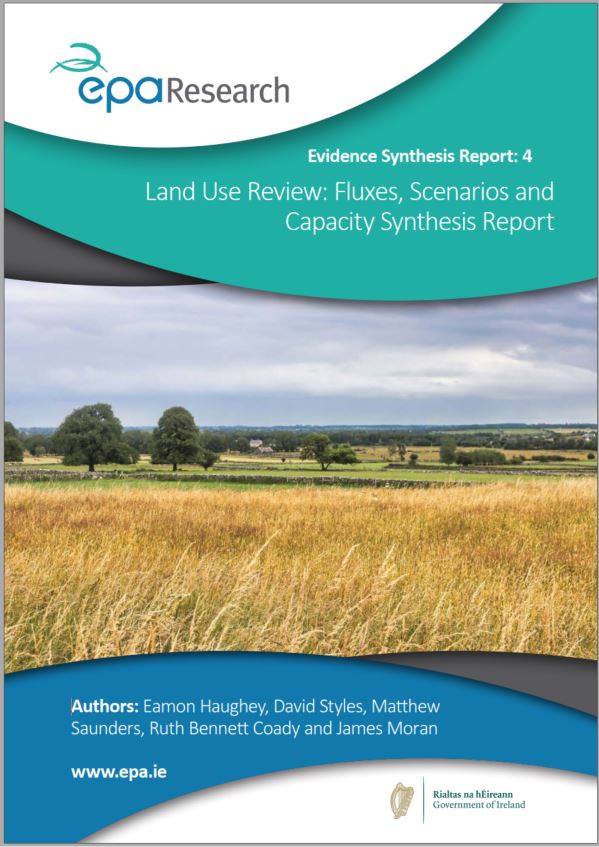
Authors: Eamon Haughey, David Styles, Matthew Saunders, Ruth Bennett Coady and James Moran, March 2023
Year: 2023
Land use in Ireland is dominated by grasslands, with significant areas of forestry and wetland, which are not distributed evenly across the country. Changes to Irelands climate have already been observed and are projected to increase over the coming decades, impacting the land system. AFOLU in Ireland is a substantial GHG source and achieving net-zero GHG emissions targets for the sector by 2050 will be very challenging. Measures considered in this report include afforestation, peatland restoration and optimised livestock production. Land based climate mitigation measures may result in trade-offs for biodiversity and water quality, the avoidance of which require an integrated approach to land management.
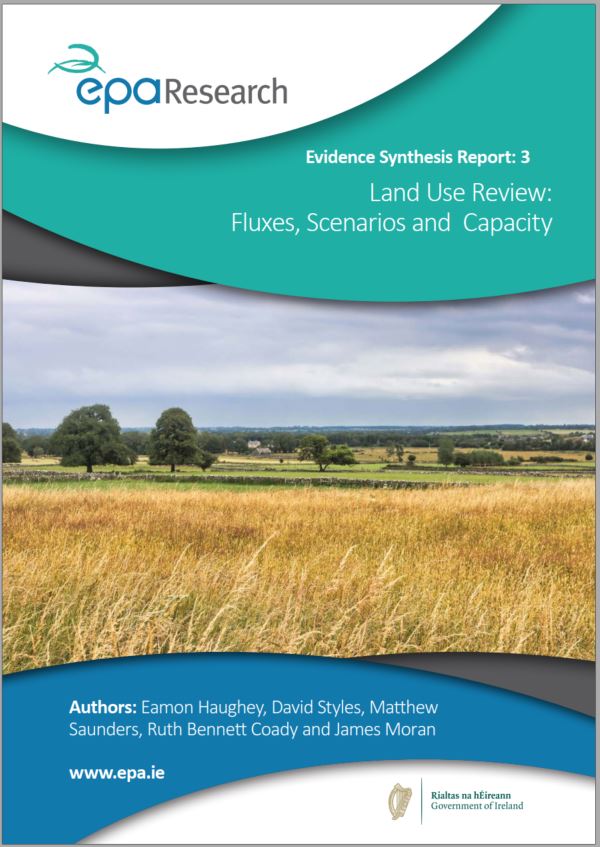
Authors: Eamon Haughey, David Styles, Matthew Saunders, Ruth Bennett Coady and James Moran, March 2023
Year: 2023
Land use in Ireland is dominated by grasslands, with significant areas of forestry and wetland, which are not distributed evenly across the country. Changes to Irelands climate have already been observed and are projected to increase over the coming decades, impacting the land system. AFOLU in Ireland is a substantial GHG source and achieving net-zero GHG emissions targets for the sector by 2050 will be very challenging. Measures considered in this report include afforestation, peatland restoration and optimised livestock production. Land based climate mitigation measures may result in trade-offs for biodiversity and water quality, the avoidance of which require an integrated approach to land management.
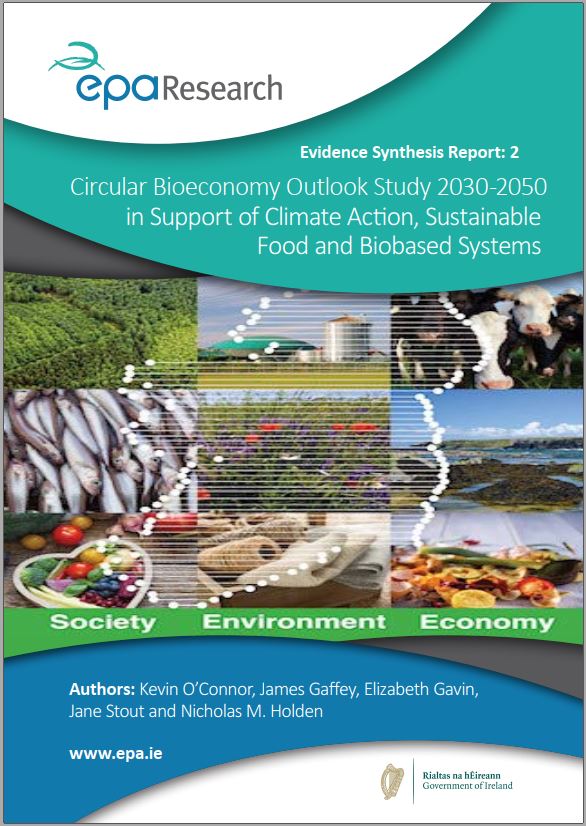
Authors: Kevin O’Connor, James Gaffey, Elizabeth Gavin, Jane Stout and Nicholas M. Holden, February 2023
Year: 2023
This report provides an outlook for Ireland’s circular bioeconomy for the period 2030–2050, highlighting the potential to create economic, environmental and social opportunities for new biobased innovations.
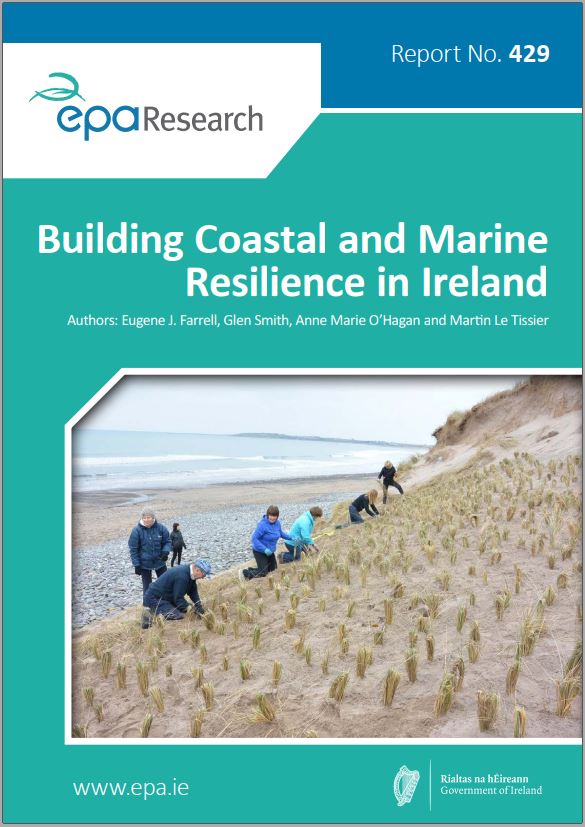
Authors: Eugene J. Farrell, Glen Smith, Anne Marie O’Hagan and Martin Le Tissier, February 2023
Year: 2023
The identification and increased awareness of climate change risks to Ireland’s coastal communities highlights the importance of building national resilience across socio-ecological and economic systems. This research investigated barriers to the environmental and socio-economic resilience of two coastal communities: Maharees, County Kerry, and Youghal, County Cork.
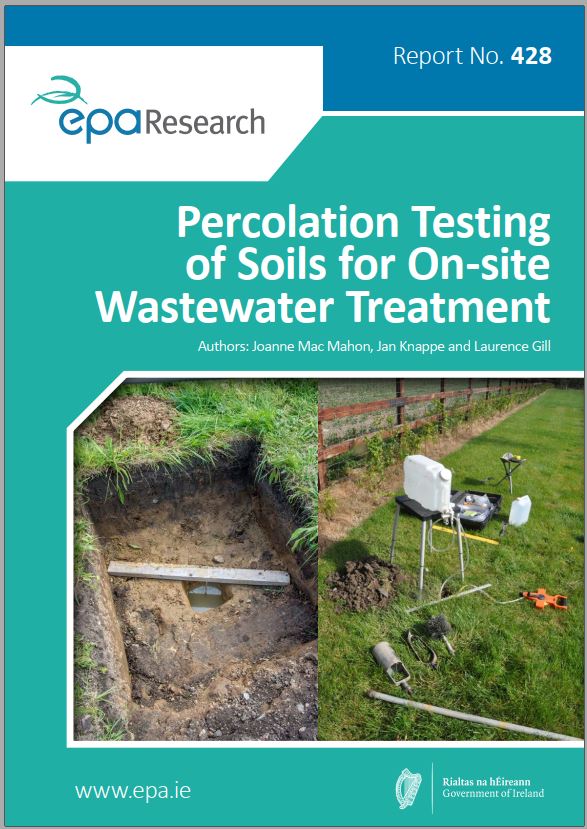
Authors: Joanne Mac Mahon, Jan Knappe and Laurence Gill, January 2023
Year: 2023
Estimation of soil permeability is a critical aspect of on-site wastewater treatment system design. The findings of this research identify a need to revise the currently available options in the Irish Code of Practice for estimating soil permeability for on-site wastewater system design. In this research, a correlation was developed between field saturated hydraulic conductivity (Kfs) and percolation time (T-values) across a full range of Irish soil texture data.
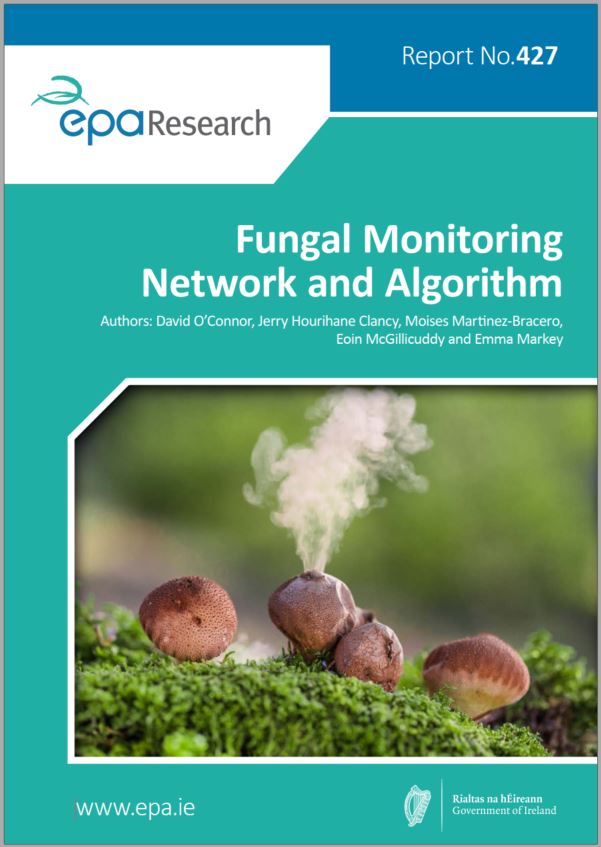
Authors: David O’Connor, Jerry Hourihane Clancy, Moisés Martínez-Bracero, Eoin McGillicuddy and Emma Markey, December 2022
Year: 2022
Bioaerosols are biological particles in the air such as pollen, fungal spores, bacteria and viruses. While most are harmless, some can trigger adverse effects such as hay fever or respiratory diseases. The impacts of bioaerosols on the health of the Irish population and agriculture and the linkages to climate remain underexplored. This project seeks to address this problem by undertaking the required monitoring and by developing a forecast model.
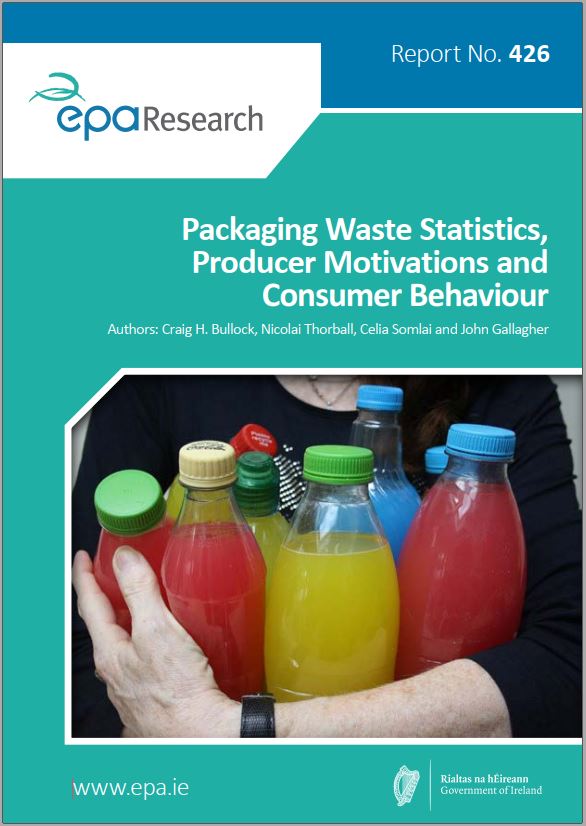
Authors: Craig H. Bullock, Nicolai Thorball, Celia Somlai and John Gallagher, December 2022
Year: 2022
The production of plastic packaging for food and other products has increased substantially over the past 50 years. The ReWrapped project investigated why Ireland’s production of plastic packaging waste appears to be higher than that of other EU Member States. The project also undertook a survey of producers to help understand what drives their use of different types of plastic and the extent to which sustainability considerations influence their decision-making.
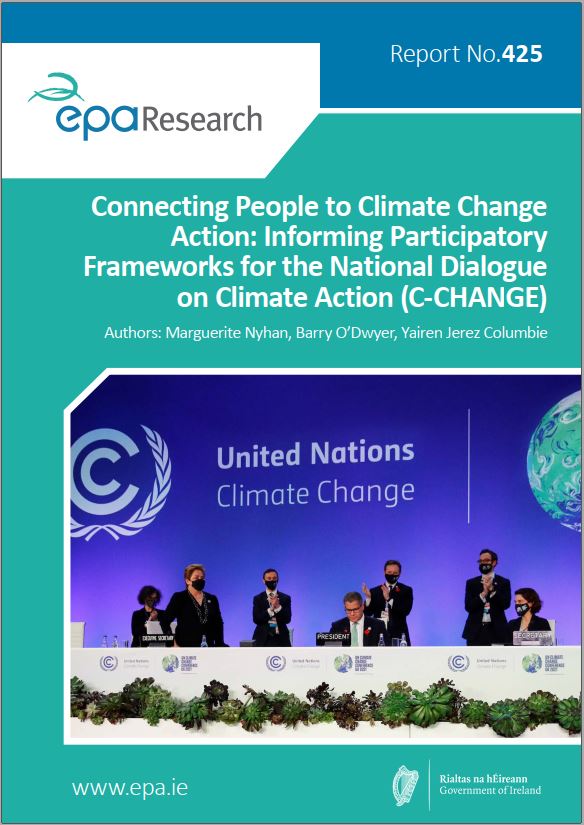
Authors: Marguerite Nyhan, Barry O'Dwyer and Yairen Jerez Columbié, October 2022
Year: 2022
Ireland has committed to achieving a net-zero and climate-neutral economy by 2050. The C-CHANGE project is focused on developing solutions and provides guidance on facilitating stakeholders’ and citizens’ participation in environmental and climate dialogues and thus in climate action nationally and internationally. The research outputs provide clear and flexible guidelines that can be adapted to different contexts, sectors and audiences by practitioners, researchers and authorities.
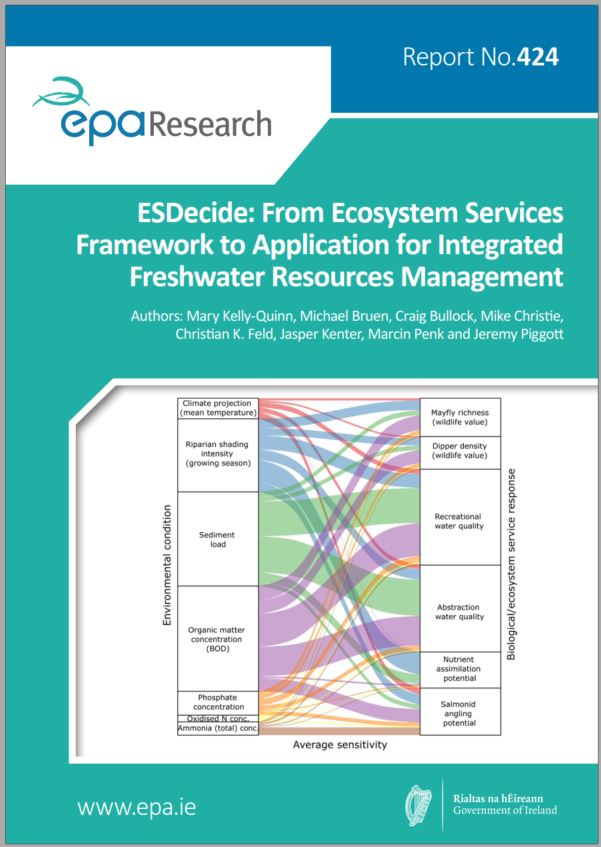
Authors: Mary Kelly-Quinn, Michael Bruen, Craig Bullock, Mike Christie, Christian K. Feld, Jasper Kenter, Marcin Penk and Jeremy Piggott, September 2022
Year: 2022
The ESDecide project set out to build on the outputs of the previous EPA-funded ESManage project by developing the tools and guidance needed to advance the incorporation of ecosystem services and the concept of “nature’s contribution to people” (NCP) into decision-making for the protection and management of freshwater resources and other related policy goals. The project developed the interactive decision support tool ProgRES, which helps river resource managers estimate the probability of changes in biological responses and the associated ecosystem services/NCP changes in environmental conditions.
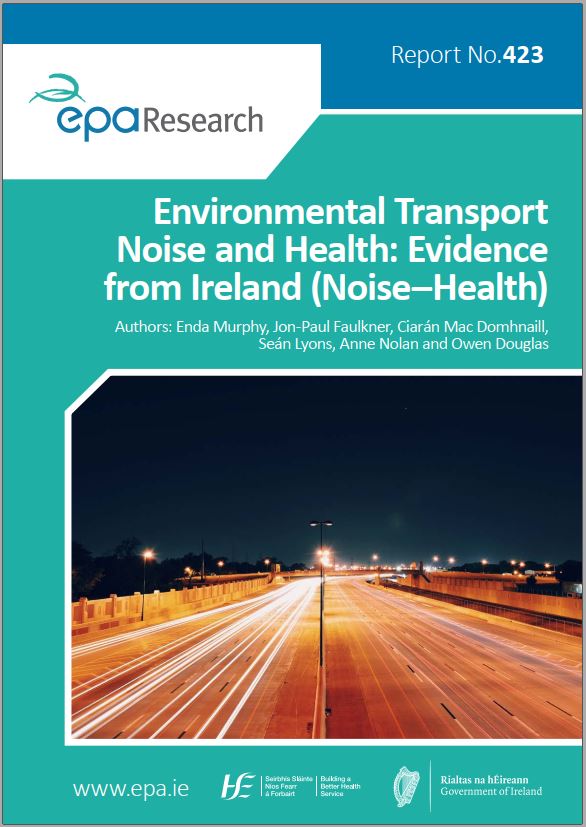
Authors: Enda Murphy, Jon-Paul Faulkner, Ciarán Mac Domhnaill, Seán Lyons, Anne Nolan and Owen Douglas, September 2022
Year: 2022
Noise is found everywhere, particularly in urban areas, and is part of daily living and activity. However, noise can be a serious risk to public health and wellbeing. This report outlines key policy and practice recommendations for managing environmental noise in Ireland. It also details how “noise–health” considerations can be better incorporated into Irish policy.
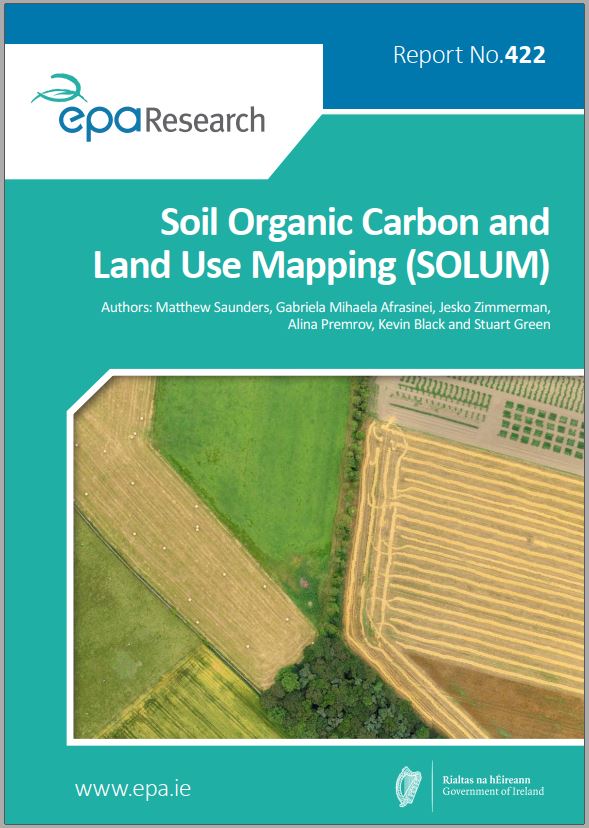
Authors: Matthew Saunders, Gabriela Mihaela Afrasinei, Jesko Zimmerman, Alina Premrov, Kevin Black and Stuart Green, September 2022
Year: 2022
Soils contain more than twice the amount of carbon held in the atmosphere, but globally approximately 1600 million tonnes of carbon are lost from the soil each year due to cultivation and land use. This research highlights how large geospatial datasets can provide an excellent source of land use information and can detect land use change events at both national and regional scales. The rule-based land use and soil inventory coupled with the soil cluster approach developed in this work could be implemented in current national land use mapping activities to enhance our ability to assess the impacts of land use and land use change on soil carbon stocks.
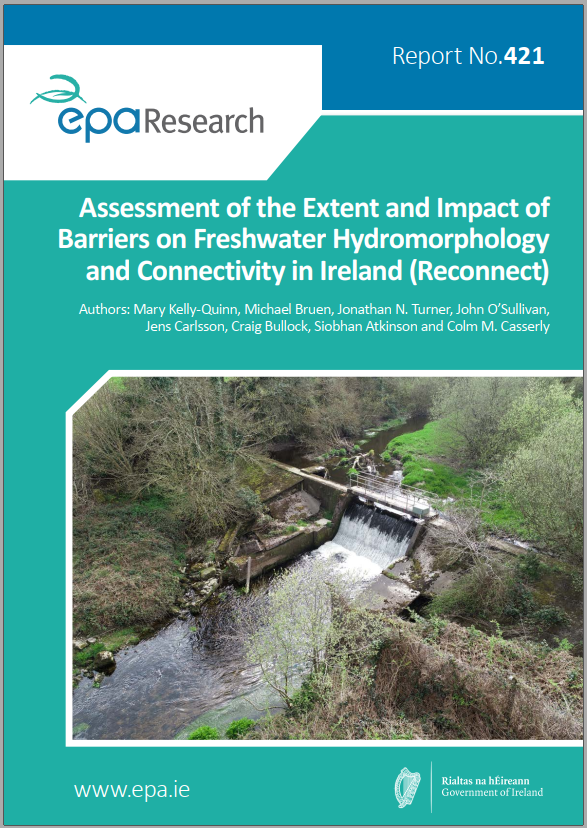
Authors: Mary Kelly-Quinn, Michael Bruen, Jonathan N. Turner, John O’Sullivan, Jens Carlsson, Craig Bullock, Siobhan Atkinson and Colm M. Casserly, September 2022
Year: 2022
The Reconnect project advanced knowledge on the impact of low-head barriers on connectivity in Irish rivers in terms of sediment dynamics and ecology (fish, macroinvertebrates and macrophytes) through studies undertaken from 2016 to 2020 in four core study areas on the Duag, Dalligan and Burren rivers and Browns Beck Brook and at 35 other locations across 12 river/stream systems. The project also developed a methodology for prioritising barriers for modification or removal to improve hydromorphology and connectivity.
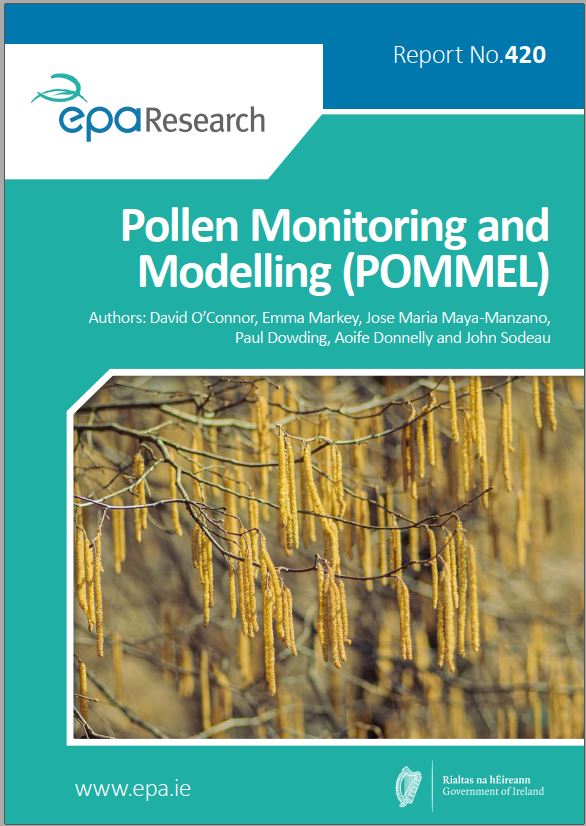
Authors: David O’Connor, Emma Markey, Jose Maria Maya-Manzano, Paul Dowding, Aoife Donnelly and John Sodeau, August 2022
Year: 2022
A reliable pollen forecast and monitoring system is a valuable tool to help allergy sufferers avoid unnecessary exposure to allergenic pollen and to optimise drug treatments by allergists. Ireland does not have a monitoring system in place and the forecast currently used is provided by the University of Worcester (UK). This project seeks to address this by undertaking the required monitoring and developing a forecast model.
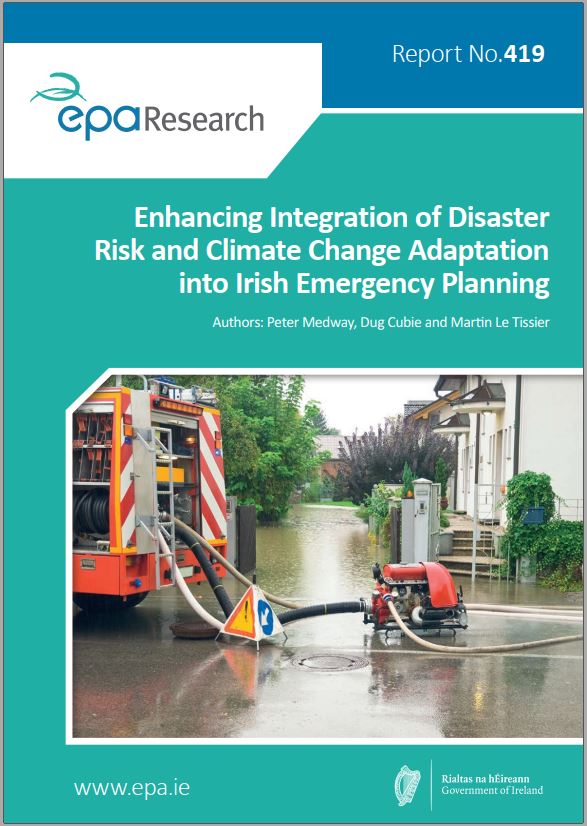
Authors: Peter Medway, Dug Cubie and Martin Le Tissier, August 2022
Year: 2022
Climate research tells us that extreme weather events will become more frequent and severe. Climate change adaptation (CCA) focuses on the probable chronic long-term impacts likely to occur across multiple sectors. In contrast, emergency planning and disaster risk reduction (DRR) primarily aims to address acute short-term impacts. The project identifies how existing approaches to disaster risk reduction, disaster risk management (DRM) and CCA in Ireland are juxtaposed and concludes that identifying ways to promote coordination and align incentives, priorities and planning processes will facilitate a more holistic and comprehensive approach to DRM at all levels of government.
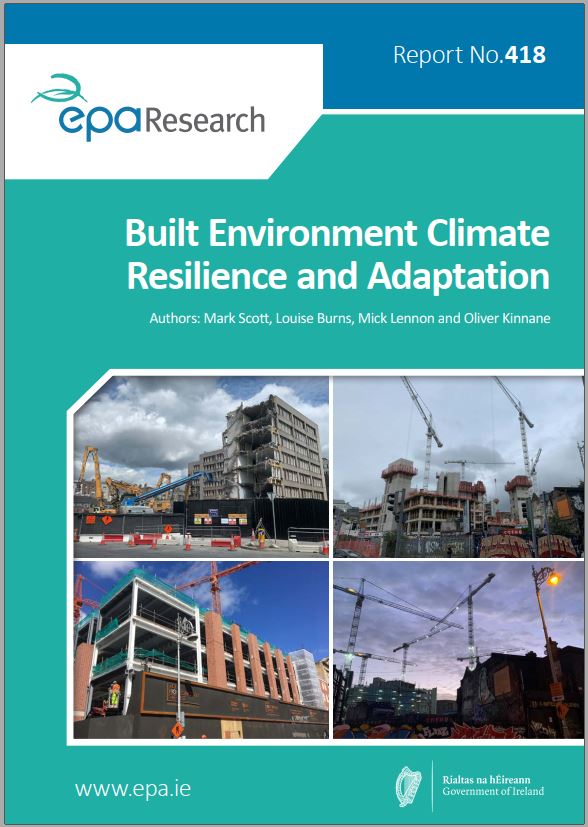
Authors: Mark Scott, Louise Burns, Mick Lennon and Oliver Kinnane, August 2022
Year: 2022
Climate change risks present a clear challenge for Ireland’s built environment. Adaptation is the critical second pillar of climate action alongside mitigation. This needs an urgent whole-of-government and whole-of-society approach. There is significant scope for increasing policy coherency towards adaptation through the planning system, building control, building regulation performance requirements, industry standards and building design specifications.